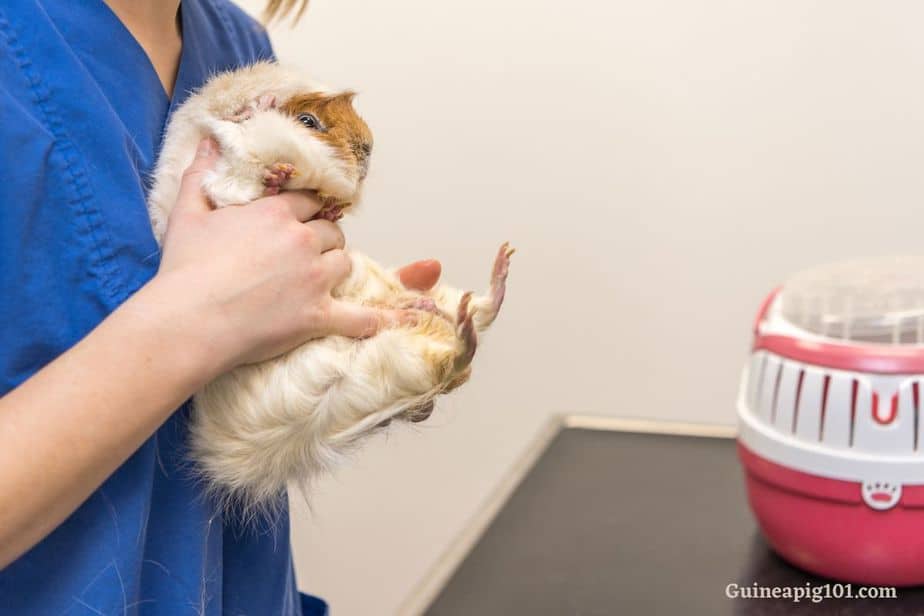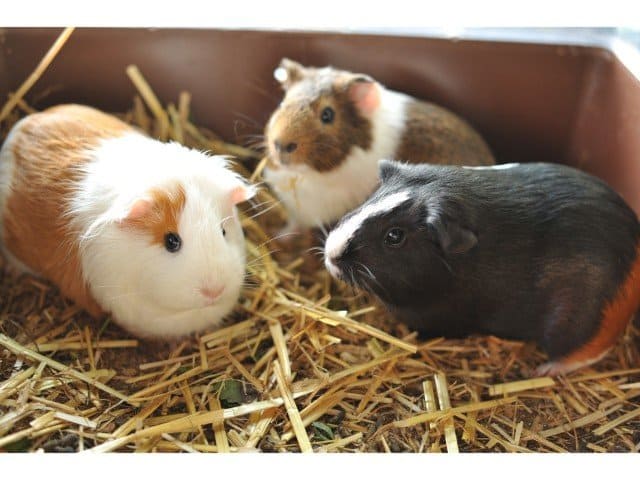Guinea pigs do have a uterus as any other mammal would have but do they also have periods? Many people find out that their guinea pig is bleeding from the bottom, and they often have one question in mind do guinea pigs have periods? Do they also bleed like other animals?
Guinea pigs do menstruate; however, they don’t have bleeding as other mammals do. Guinea pigs do have a heat cycle, which usually runs in a period of 16 days, anytime in a year. During this cycle, the female is most fertile for 6-11 hours and will allow mating, especially during nighttime.
Some guinea pig owners often notice some blood coming out from their guinea pig’s bottom and often confuses that their guinea pigs are menstruating. But if they don’t menstruate, then what is the cause of bleeding? Can it be something serious? Let’s find out!
Also read: Red urine in guinea pigs (Causes and what to do)
Why is my guinea pig bleeding from her bottom?
Bleeding during the heat cycle or during any other time can be a common phenomenon for other mammals like dogs, humans, etc. but it is definitely not the case with guinea pigs.
In fact, if your guinea pig is bleeding from the genitals, then it is definitely a sign of some health issues in them, and we recommend you to visit a vet as soon as possible to find the exact cause of the same.
However, we have interviewed some vets to find out some of the most common causes of bleeding in guinea pigs. We found that the most common causes were UTI, Bladder stone, Pyometra, and Tumors.
The possible causes for bleeding in guinea pigs
There can be a lot of causes of bleeding in guinea pigs. But today we have listed out some of the most common reasons for the same. So, let’s check it out:
Urinary tract infection

Urinary tract infection, also known as UTI is one of the most commonly diagnosed diseases that leads to subtle bleeding in guinea pigs. Many people often get confused that guinea pigs have periods which leads to bleeding but that is actually not possible.
UTI occurs when there is an infection in the urinary tract along with cystitis(bladder inflammation) that leads to blood passing in the urine.
Many guinea pigs often get confused that the bleeding is coming from their genital(vaginal) area while actually, it is coming from the urine.
UTI is ubiquitous among rodents as their bodies are close to the ground, and it is quite natural for bacteria to reach their urethra leading to infection in them. The unhygienic living environment can be a reason for bacterial formation in their cage, which develops into UTI.
Symptoms:
- A small amount of blood dripping from the genitals
- If you find any blood signs in the urine at the bottom of the cage
- Sighting of Blood tinged bedding
- Squeaking while urinating
- Foul smell in urine
- Your guinea pig will be more thirsty than ever.
Diagnosis:
Try to make your guinea pig urinate on a hard surface(empty Litter Box, kitchen top) and collect the urine samples using a syringe. You can take the same to an exotic vet so that they can check and confirm if your guinea pig is suffering from UTI or not.
Treatment:
- Clean the cage more frequently and make sure you replace the bedding every time you clean the cage. If you are using fleece, wash it properly before using it again.
- Provide plenty of fresh drinking water at least twice a day. UTI often increases the thirst; thus, your guinea pig will need a lot of water.
- Try offering some unsweetened cranberry juice(fresh if possible). Although cranberry juice doesn’t cure the infection completely, it does contain a lot of antioxidants which will clean some bacteria from the urine. Thus your guinea pig will feel a little relaxed. This is a great way to keep your guinea pig calm until you visit a vet. (consider it as first aid)
- Visit a vet and confirm the antibiotics which you should be giving to your guinea pigs. Some conventional medicines safe to use on guinea pigs for UTI includes trimethoprim-sulfa, enrofloxacin, ciprofloxacin, chloramphenicol, and metronidazole. But do get a prescription before serving it to your guinea pigs.
Tumors

Another common reason for bleeding in guinea pigs is the formation of tumor in some part of the body or in the urinary tract itself.
Tumors are generally caused by an abnormal multiplication of body cells, resulting in the formation of a lump of tissues. They can be either malignant( spreading quickly) or benign(harmless).
Most of the time, the abnormal growth of tissues irritates to other nearby body organs it is growing off or may start bleeding in itself, which leads to passing of blood from the genitals of your guinea pigs.
Although the blood passes through the urinary tract just like UTI, still you can easily distinguish the same as the color of the blood would be intense red as compared to a little red in UTI.
Symptoms:
- Lumps appearing on the belly, or other parts of their body. Note: Not all the lumps are due to the tumor, but you should definitely get it checked.
- You may notice your guinea pig is not eating their regular diet and is losing their appetite.
- The area around the lumps or other parts of their body might have bald patches.
- Difficulty in breathing and sluggish behavior are some other common symptoms following the lumps.
- If the tumor is in the urinary tract, then you might notice some traces of blood in their urine.
Diagnosis:
While external tumors can be examined by taking a sample of it and studying the nature of the same to understand whether it is a benign or a malignant one, you might need to take your guinea pig for some other testing if the tumor is an internal one.
Most likely an Xray, Ultrasound, or MRI are some standard tests to determine the cause of tumor in guinea pigs.
Treatment:
- A benign tumor can be kept in control with proper medication. However, if your vet finds that surgery is needed, then they might suggest you get it removed by doing a small operation. Generally, these types of tumors are not so lethal.
- A malignant tumor needs immediate surgery as the chances of spreading and damaging other organs are quite high in this type of tumor. Surgery might be the only option in this case.
Bladder stone

A bladder stone is yet another reason why you may find some blood in the genital area and urine of your guinea pigs. The bleeding can often confuse some owners and make them believe that their guinea pigs have periods which is the reason for bleeding but in reality, it is not true.
According to a study, the stones are more common in females than males. It is usually caused due to calcification of oxalates and other minerals surplus in guinea pig body.
Feeding your guinea pig a high calcium diet can be a significant cause of formation of bladder stones in them.
Symptoms:
- Blood in urine, Or white gritty spots when urine dries up.
- Difficulty while urinating
- Lethargic and less prone to move
- Loss in appetite
Diagnosis:
X-ray is one of the first tests to confirm the presence of bladder stone in guinea pigs. If stones are detected, then the vet may further analyze the cause to understand the cause of formation of the same.
Treatment:
- The treatment of bladder stone in guinea pig includes a small surgery by the vet to remove the stone from their body.
Pyometra

Pyometra is one of the most common diseases in pets like dogs and cats. Nowadays, even guinea pigs can get infected by the same. Pyometra is caused by a bad infection which leads to an excessive of puss buildup in the uterus of your guinea pig.
Most of the time, you will notice some vaginal discharge of pus mixed with blood or urine. The appearance of blood in urine and genital area sometimes confuses people and they believe that their guinea pigs might be menstruating which is the cause of bleeding but actually it is not the case.
Also sometimes, it can be difficult to distinguish between UTI and pyometra. We recommend visiting a vet if you have any confusion in you feel your guinea pig shows any sign of the same.
Symptoms:
- Increase in thirst and urination
- Loss of appetite
- Fever and vomiting
- Lethargic and weakness
Diagnosis:
A vet visit is a must for proper diagnosis of pyometra. The vet may do a test of urine along with a few other tests to confirm the cause.
Treatment:
- The treatment of pyometra might include surgery and spraying your guinea pigs as pyometra bacteria is too strong for mild antibiotics. Also, guinea pigs cannot be given some strong antibiotics like dogs as it can kill some bacteria in their intestine and even worsen the situation.
How can we prevent bleeding in guinea pigs?
Some of the preventive measures for bleeding in guinea pigs are as follows:
- Feed your guinea pig with an appropriate diet which contains the right balance of good quality hay, pellets, and fresh veggies. This is a great way to prevent diseases like bladder stones.
- Keeping the enclosure clean and using good quality bedding is a must. Doing so keeps the environment hygienic and chances of bacterial infection leading to UTI and Pyometra goes down significantly.
- Spraying a female guinea pig at the age of 5-6 month is an excellent way to prevent tumor and infection in their urinary tract.
- Always ensure you provide enough floortime, a large cage, and other basic needs that keep your guinea pigs happy and active. This is one of the best things you can do to prevent most of the diseases caused by obesity.

Summary
So, as we have already understood that guinea pigs do menstruate, but they don’t bleed as other mammals do. If you find that your guinea pig is bleeding from genitals, then you must visit the vet immediately as periods are definitely not the cause of such bleedings.
If you want to learn more about some common health problems in guinea pigs and other general health care needs, then I would recommend you go through some of our recommended articles:
- Do Guinea Pigs Shed?
- Vitamin C For Guinea Pigs
- Guinea Pig First Aid Kit
- Do Guinea Pigs Need Vaccination?
Source:
MSD VET MANUAL
Sawneeanimalclinic
